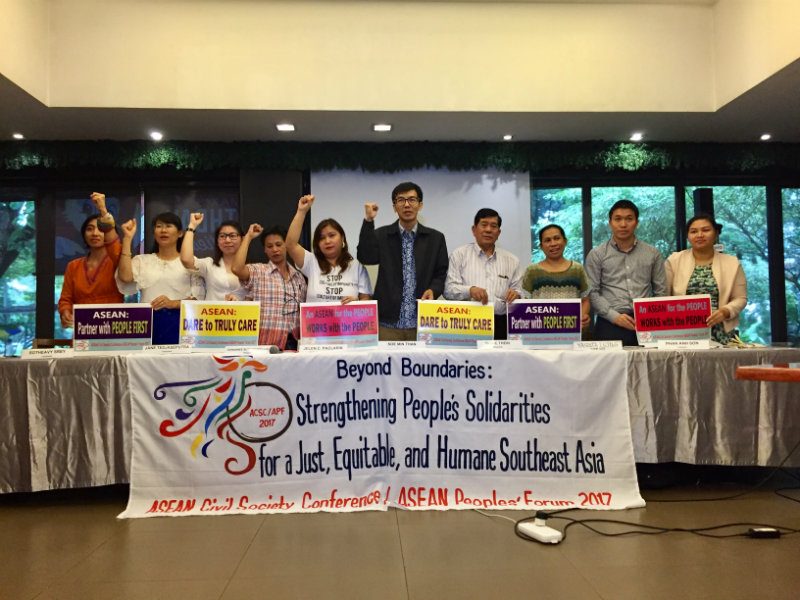SUMMARY
This is AI generated summarization, which may have errors. For context, always refer to the full article.

MANILA, Philippines – Will leaders of Association of Southeast Asian Nations member-states tackle human rights during the 31st ASEAN Summit in Manila? (READ: The deafening silence of ASEAN on human rights violations)
While it is not yet clear whether ASEAN leaders will stay mum on the pressing issue of human rights in the region, civil society groups promised they won’t.
Hundreds of civil society groups from Southeast Asia vowed to highlight the topic of human rights during the ASEAN Civil Society Conference (ASCS) to be held simultaneously with the regional summit, or from Monday to Wednesday, November 13 to 15.
To be held at the University of the Philippines Diliman campus, the conference aims to traverse the landscape of challenges within the ASEAN region. To jumpstart the parallel activities, the ASCS held a press conference in Quezon City on Friday, November 10.
“ASEAN is not a safe place for human rights activists and defenders, journalists, and people who have been progressive and modernizing ideas,”Jelen Paclarin, chairperson of the ACSC steering committee, said as she read the network’s statement.
Human rights in ASEAN
The 2016 Bersih 5 protest rally in Malaysia clamped down on several human rights activists, Rohingya Muslims are subjected to systematic attacks in Myanmar that have forced more than 600,000 to the borders, LGBTIQ activists in Indonesia have been subject to a wave of attacks, and a government crackdown has suppressed opposition and a free press in Cambodia.
In the country’s own backyard, the Philippine government, the host of this year’s ASEAN summit, has waged a war against drugs, leaving over 13,000 suspected drug personalities killed in the process.
Civil society groups agreed that such incidents should not happen.
“Violence against human rights defenders in Indonesia and other ASEAN member-states, should not be allowed. They should not be harassed or persecuted under this rule of law principles,” said Jane Tedjaseputra of Indonesian Legal Aid Foundation, a civil society group in Indonesia.
In a previous interview with Rappler, Human Rights Watch (HRW) deputy director for Asia Phelim Kine said that the association has fallen short in ensuring that the countries follow benchmarks when it comes to protecting the rights of their citizens.
In its statement, ASCS said “indeed, change must happen” but it should be transformative change.
“This change must transform the existing systemic inequalities and injustices towards a socially-responsive and rights-based ASEAN,” it said.
Non-interference clause
During the press conference, civil society groups also called on the dropping of the “non-interference” principle within the context of human rights in ASEAN.
Kine agreed with this, adding that the “silence” of ASEAN member-states on human rights is rooted in the principle adopted under the Treaty of Amity and Cooperation (TAC) of 1976.
While it may look like such principles in the ASEAN Charter are meant to protect the independence of each member-state, that is not case with the non-interference clause, according to the civil society groups.
“The states are using the non-interference to their advantage. This is the reason why we need to drop it, within the context of human rights perspective,” said Joyce Godio of the Asian Indigenous Peoples’ Pact.
How would dropping the region’s fight for human rights benefit from dropping the non-interference principle in the ASEAN Charter?
Paclarin said it will be difficult for a regional human rights mechanism to come in if the non-interference principle will remain as part of the ASEAN Charter.
“The dropping of the non-interference must also be in connection with the review of the ASEAN Charter itself. Our government has been using the principle as an excuse not to respond to various human rights violations particularly, for example, in the extra-judicial killings in the Philippines,” Paclarin added.
By the end of the ACSC gathering, civil society groups are expected to come up with a joint statement and recommendation for ASEAN leaders regarding the pressing issues faced by the region. – Rappler.com
Add a comment
How does this make you feel?
There are no comments yet. Add your comment to start the conversation.